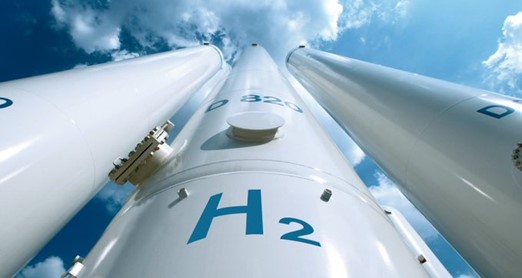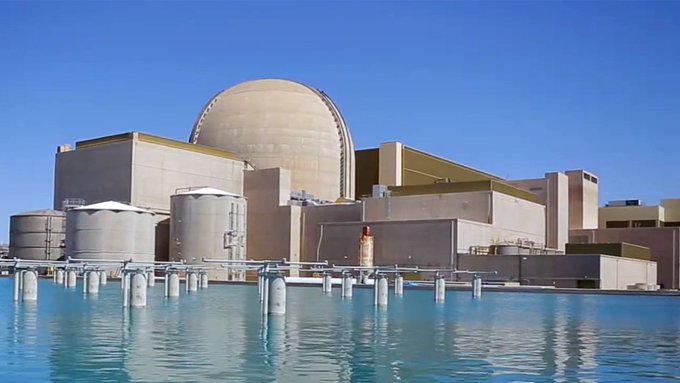One of two Westinghouse AP1000 reactors to remain unfinished at the Summer nuclear power plant. (Photo: SCE&G)
Kevin Marsh, former chief executive officer and chairman of the board of directors of SCANA Corporation, has become the first person to be sentenced to prison for involvement in the 2017 collapse of the $10 billion Summer nuclear plant expansion project. Marsh was sentenced in federal court on October 7 and in state court on October 11.
The failure to complete the construction of two Westinghouse AP1000 reactors at the single-unit nuclear plant in Jenkinsville, S.C., cost ratepayers and investors billions, damaged the brands of then owners SCANA and Santee Cooper, and put some 6,000 people out of work.
Inside the New Safe Confinement covering the sarcophagus of Chernobyl’s Unit 4. (Photo: SSE Chornobyl NPP)
A team of scientists from the United Kingdom’s University of Bristol were given access to the Chernobyl nuclear power plant in Ukraine, advancing a project to train robots and artificial intelligence systems to measure radiation and create 3D maps.
A slideshow of the team’s visit to Chernobyl’s Unit 4 control room and New Safe Confinement structure, where they deployed radiation mapping and scanning sensors, including a LIDAR-equipped robot call Rooster, appears on Gizmodo.
This June 2021 photo of ITER vacuum vessel sector #6 includes two panels of thermal shielding ready to slide into place. (Photo: ITER/Courtesy of Chang Hyun Noh)
Following a week of heightened attention to all things hydrogen preceding Hydrogen and Fuel Cell Day (October 8), Bernard Bigot, director general of the ITER Organization, published an op-ed on October 11 in The European Files, a magazine billed as an “effective work tool for European deciders.” Bigot’s article, “Hydrogen fusion: The way to a new energy future,” doubled as a fusion primer, promoting the technology as a future source of clean energy that is fueled by hydrogen and is capable of providing heat and power to produce more hydrogen.
Three isophase bus ducts at a nuclear power plant exit the turbine building at the upper left, then branch off the main buses (center) to the reactor unit's auxiliary transformer on the right. (Photo: Ameren Missouri)
Over the course of the last year, many power plants have shortened, postponed, or rescheduled their maintenance outages due to the pandemic. Unfortunately, this has caused some critical maintenance activities to be put on the back burner. For some in the power generation industry, this has presented uncertainties as the volume of unplanned outages caused by deferred maintenance has risen.
Canada's Bruce nuclear power plant. (Photo: Chuck Szmurlo)
Canada’s Bruce Power, operator of the eight-unit Bruce nuclear power plant in Kincardine, Ontario, is undertaking a series of environmental initiatives to help attain its goal, announced in March, to achieve net-zero greenhouse gas emissions from site operations by 2027.
Workers demolish a large industrial cooling tower built in 1952 at the DOE’s Savannah River Site. (Photo: SRNS)
Savannah River Nuclear Solutions (SRNS), the management and operations contractor for the Department of Energy’s Savannah River Site, has torn down a large industrial cooling tower at the site’s D Area complex. The cooling tower, built in 1952, is one of more than 30 structures being removed from SRS’s D Area as the DOE works to reduce the site’s footprint.
Savannah River Remediation’s Mark Schmitz (left) and Denmark Technical College’s Willie L. Todd Jr. sign a memorandum of understanding to reaffirm the partnership between their respective organizations. (Photo: SRR)
Savannah River Remediation (SRR) and South Carolina’s Denmark Technical College (DTC) have renewed a memorandum of understanding that has a goal of preparing DTC students for work in the industrial and nuclear environment while also providing SRR with a potential pipeline of future employees.
SRR is the Savannah River Site’s liquid waste contractor, consisting of a team of companies led by Amentum, with partners Bechtel National, Jacobs, and BWX Technologies. Subcontractors include Orano, Atkins, and Amentum N&E Technical Services.
DTC is South Carolina’s only technical college that is also a historically black college or university.
Balázs Bodnár, managing director of Framatome Hungary (left), shakes hands with Habil István András, rector of the University of Dunaújváros, joined by Ferenc Berki, president and CEO of Hunatom. (Photo: Framatome)
The Hungarian office of Framatome this week signed a memorandum of understanding with Budapest-based research and economic development company Hunatom and the University of Dunaújváros to work together supporting nuclear education and training, research and development, and implementation of new technologies for Hungary and surrounding countries.
Representatives of the three organizations signed the MOU during a ceremony at Hungary’s University of Dunaújváros, about 40 miles south of Budapest.
Nitya Chandran, a facility engineer with the Washington State Department of Ecology, inspects Hanford’s tank-side cesium removal system. (Photo: DOE)
Washington state and Oregon will receive approximately $33.5 million through four financial assistance grants from the Department of Energy to fund programs related to the cleanup of the department’s Hanford Site near Richland, Wash. The grants will support environmental response regulatory activities, emergency preparedness, and public information programs in the two states.
All four grants, which were noncompetitively awarded, are for fiscal years 2022 through 2026.










 The Minerals Council of Australia (MCA) last week released
The Minerals Council of Australia (MCA) last week released 







